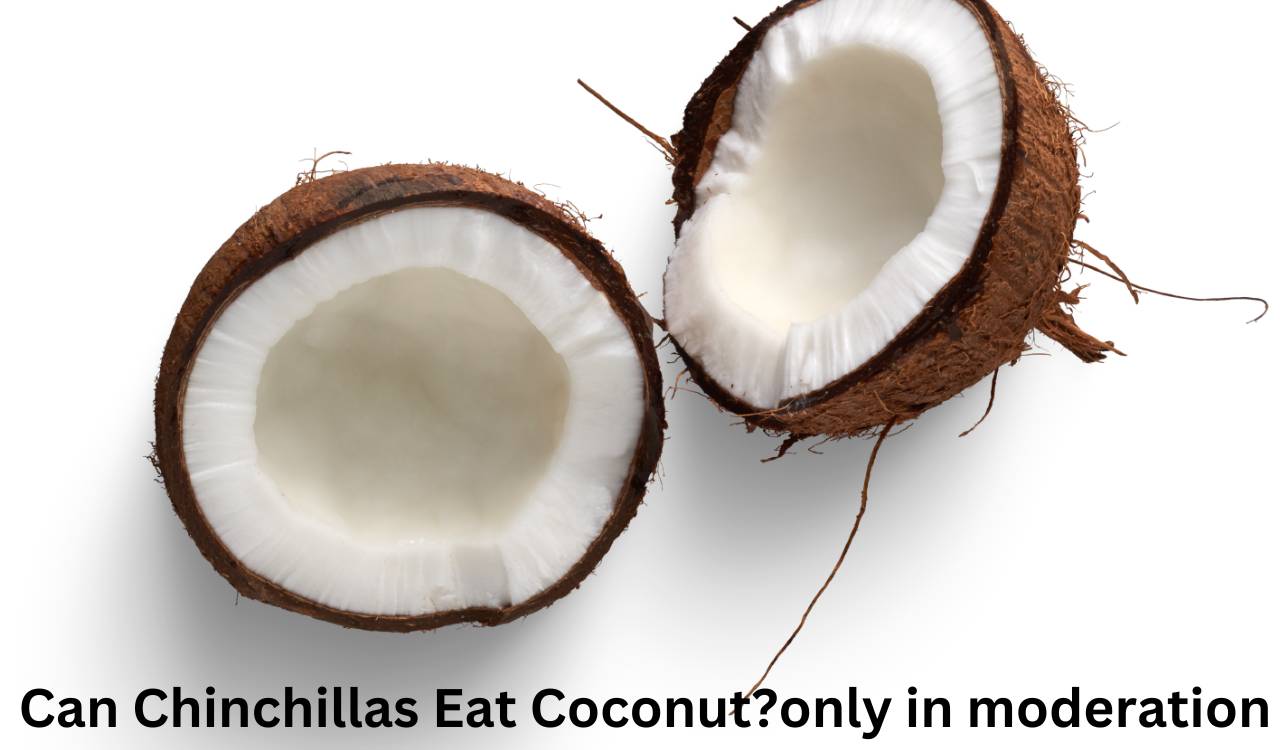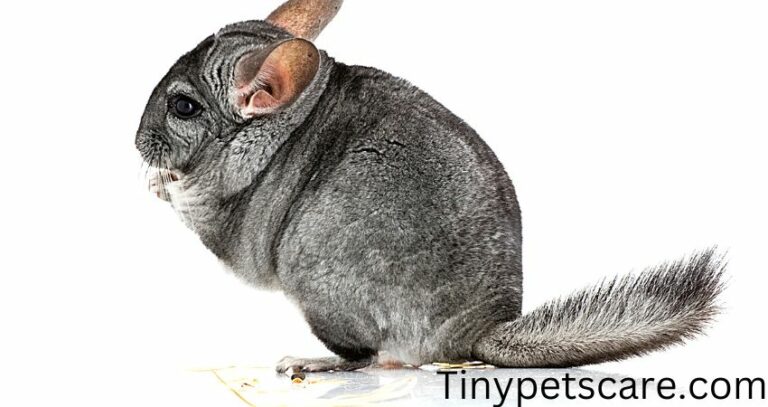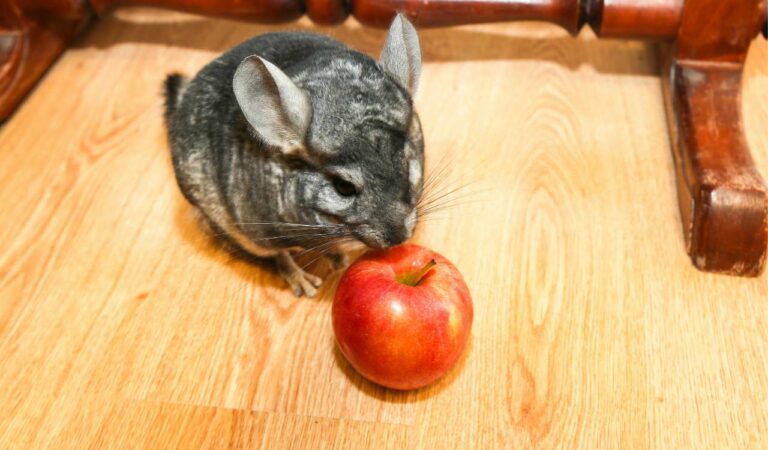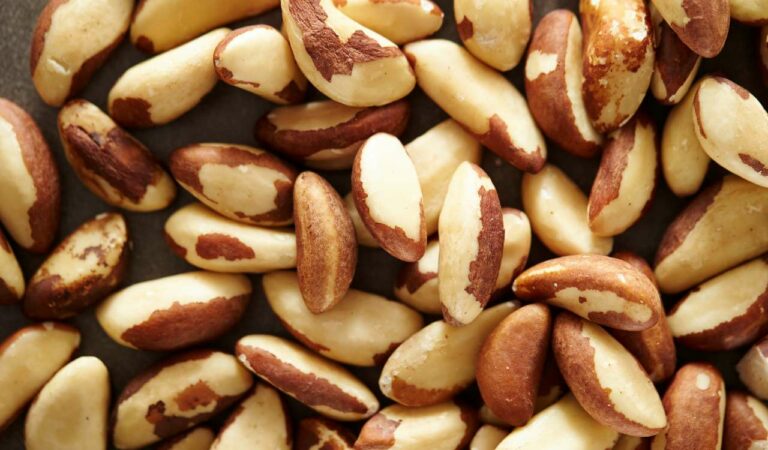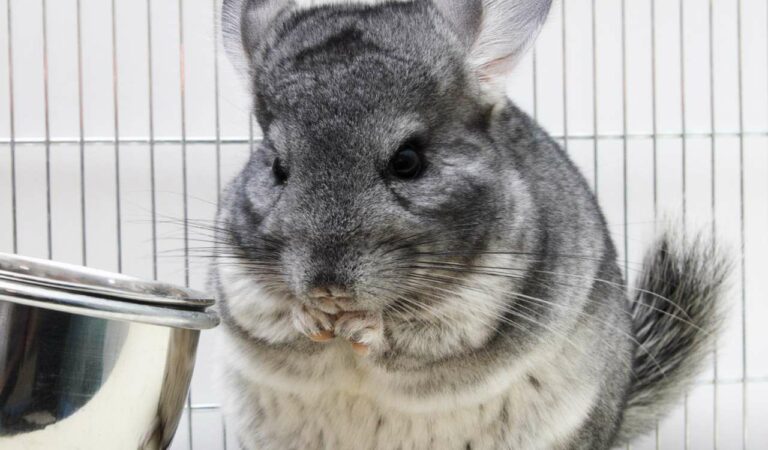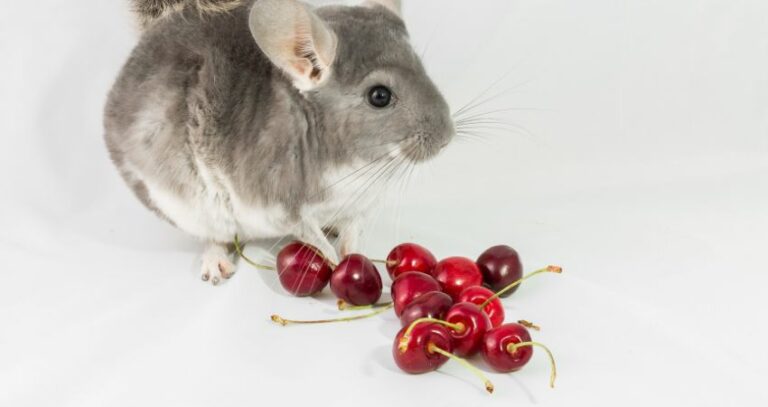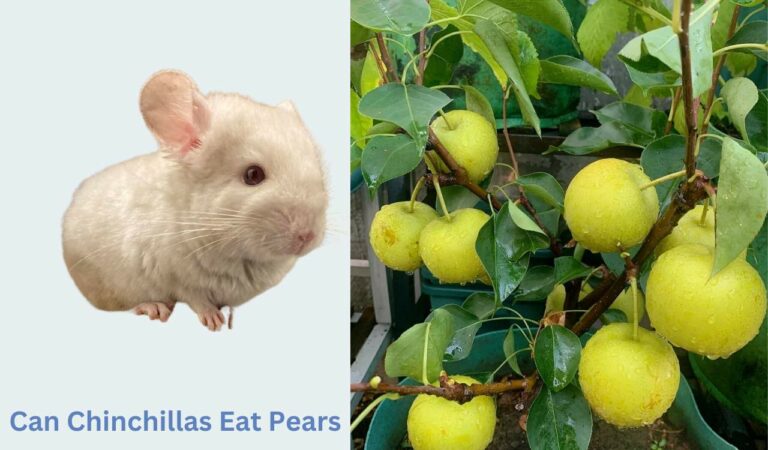Can Chinchillas Eat Coconut? [Only In Moderation]
Coconut has become increasingly popular in recent years due to its many health benefits. If you’re a chinchilla owner, you may wonder if it’s safe to treat your furry friend with coconut.
So, can chinchillas eat coconut? The answer is yes. Coconut is safe for chinchillas to consume as an occasional treat, but it should not make up a significant portion of their diet. Coconut is high in fat and sugar, which may result in weight gain, digestive problems, and other health issues if overfed.
This article will explore whether or not chinchillas can eat coconut and everything you need to know about feeding your pet this tropical fruit.
Can Chinchillas Have Coconut?
Yes, you can feed coconut to chinchillas. Coconut is a nutrient-dense fruit rich in vitamins and minerals such as vitamin C, potassium, and magnesium.
This fruit has numerous advantages, including improved skin and coat health, increased immunity, and improved heart health.
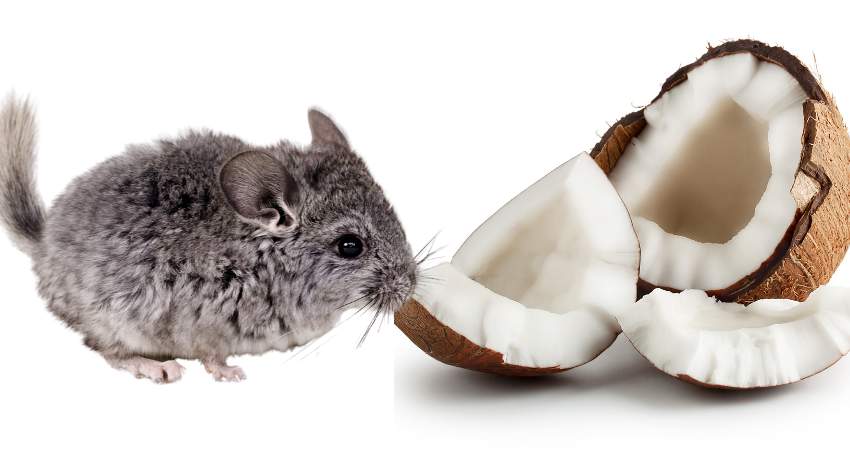
- However, coconut is high in fat and sugar, which can cause various health issues if consumed excessively.
- In addition to using coconut sparingly, it should be unsweetened and free of additives. Sweetened coconut or coconut products containing preservatives and other chemicals can harm your chinchilla’s health.
- Always read the labels of the coconut products you intend to feed your chinchilla to ensure they are safe and healthy.
- It’s also critical to introduce new foods to your chinchilla’s diet gradually and in small amounts.
- Begin by giving your chinchilla a small piece of coconut and watching their reaction. If your chinchilla develops digestive issues like diarrhea or bloating, stop feeding them coconut and consult your veterinarian.
What Are The Various Coconut Parts And Products A Chinchilla Can Eat?
Coconut is a versatile fruit that can be consumed in various forms. However, not all coconut parts and products are safe for chinchillas to eat. Here’s a breakdown of the various coconut parts and products that chinchillas can consume:
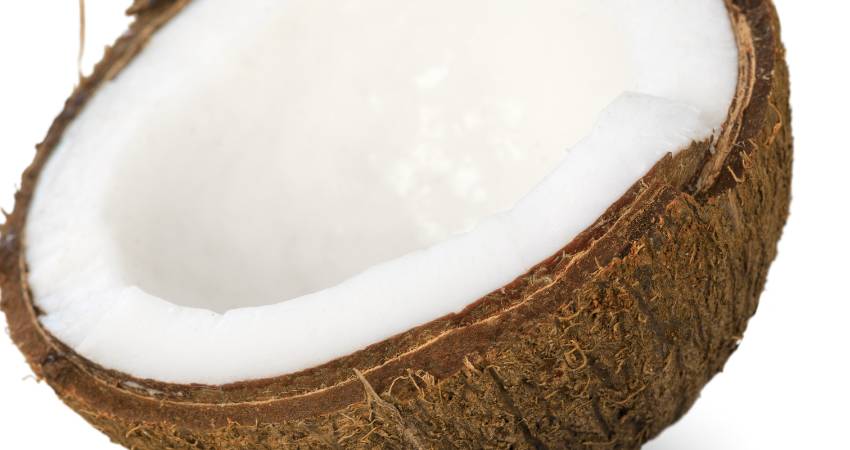
Coconut Meat
Chinchillas can eat fresh coconut meat in small amounts as an occasional treat. Coconut meat is the white fleshy part of the coconut fruit and is a good source of fiber, vitamins, and minerals.
Coconut Oil
Coconut oil is a great addition to a chinchilla’s diet. It contains fatty acids, which help strengthen the animal’s immunity. However, like coconut meat, offer the oil in moderation. You can give your chinchilla 1/4 teaspoon of oil once a week.

In addition to internal benefits, coconut oil is also beneficial to your chinchilla’s skin as you can use it as a moisturizer that you can apply on your pet’s skin. Also, coconut oil can treat minor injuries on the chinchilla’s skin and act as a pesticide to keep fleas or mites away.
Consult your veterinarian before introducing new products to your pet’s skincare routine.
Coconut Milk
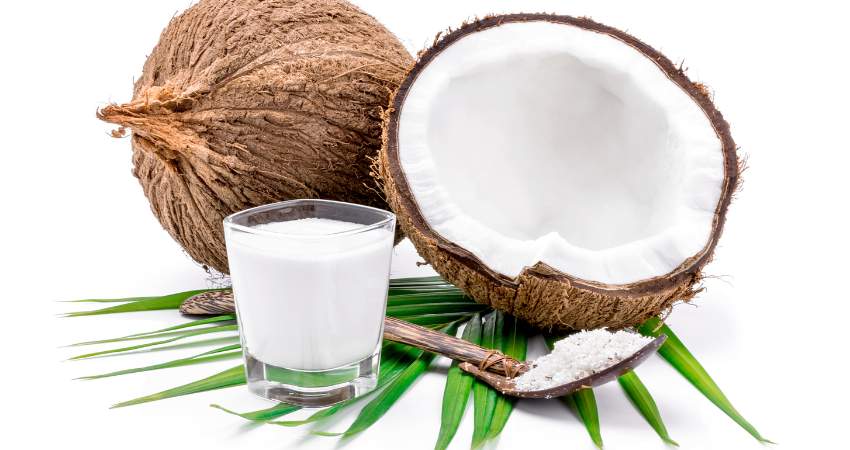
Coconut milk, like coconut oil, should be consumed in moderation by chinchillas. Coconut milk is a known laxative; if you overfed them, it can cause digestive issues in the little pet. Aside from that, coconut milk has several health benefits, such as promoting healthy fur and supporting the immune system.
Coconut Water
It’s not recommended to give coconut water to chinchillas. Why? Because the chinchilla will have already got enough hydration from the coconut fruit. Too much water can cause stomach issues such as diarrhea in the chinchilla.
Also, coconut water is high in fats and sugar, which can cause digestive upset and potentially lead to other health issues such as diabetes. So stick to normal water.
Coconut Shell and Husk
Chinchillas constantly develop teeth that must be worn down to prevent overgrowth and other dental issues. They keep their teeth in check by biting hard items like coconut shells. Some chinchillas may also like eating the shell.
Chinchillas can utilize coconut husks as a hiding place or a nice place to rest. Chinchillas are naturally burrowing creatures, and they often appreciate having a safe, contained location to withdraw to when they are scared or anxious.
Benefits Of Coconuts For Chinchillas
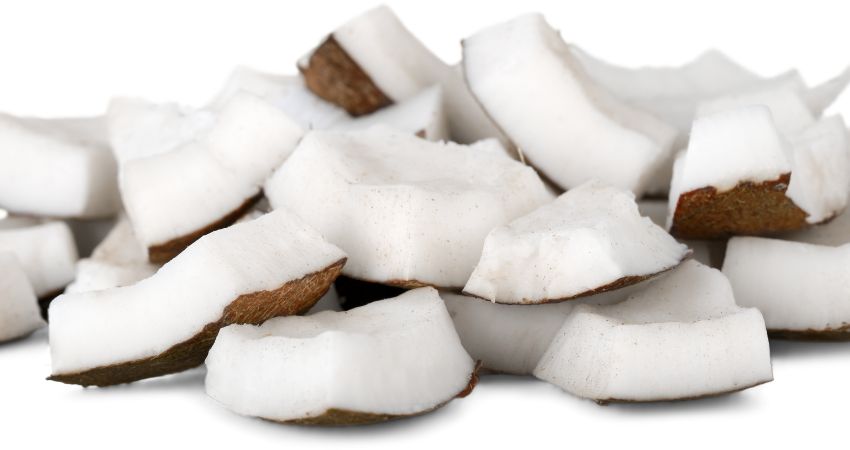
High Fiber Content
Coconuts contain a high amount of dietary fiber, which is essential for maintaining a healthy digestive system in chinchillas. Fiber helps to regulate bowel movements, preventing constipation and ensuring that waste is removed from the body efficiently.
Accordingly, fiber can help to regulate blood sugar levels, prevent obesity, and promote a healthy weight.
Healthy Fats
Coconuts are high in healthy fats, such as medium-chain triglycerides (MCTs), which are easily digestible and can provide chinchillas with a quick energy source. MCTs have also shown anti-inflammatory and antioxidant properties, aiding disease prevention.
Zinc
Zinc is essential for maintaining healthy skin and a strong immune system in chinchillas. This also plays a role in wound healing and forming new cells.
Potassium
Coconuts are rich in potassium, a mineral that helps regulate fluid balance and supports proper muscle and nerve function. Potassium also helps maintain healthy blood pressure levels in chinchillas.
Phosphorus
Phosphorus is an essential mineral for chinchillas as it plays a vital role in maintaining strong bones and teeth. Chinchillas need adequate phosphorus levels to maintain healthy organ function, including the kidneys, heart, and muscles.
Phosphorus plays a critical role in energy metabolism and cellular function. Thus, it is involved in many biological processes in the body, including DNA synthesis, protein synthesis, and cell signaling.
Iron
Iron is necessary to form hemoglobin, the protein that carries oxygen in the blood. This element also plays a role in the immune system and energy metabolism.
Lauric Acid
Coconuts contain lauric acid, a medium-chain fatty acid shown to have antibacterial, antiviral, and antifungal properties. Lauric acid can help boost the immune system and protect against infections in chinchillas.
What Is The Nutritional Content Of Coconut?
Here is a breakdown of the nutritional content of coconut:
| Nutrients | 100g of Coconut meat |
| Calories | 354 kcal |
| Protein | 3 g |
| Carbs | 15 g |
| Fiber | 9 g |
| Fat | 33.5 g |
| Manganese | 1.5 mg |
| Copper | 0.435 mg |
| Selenium | 10.1 µg |
| Magnesium | 32 mg |
| Phosphorus | 113 mg |
| Iron | 2.43 mg |
| Potassium | 356 mg |
How To Serve Coconut To Your Chinchilla?
Here are some of the most common ways to serve coconut to chinchillas:
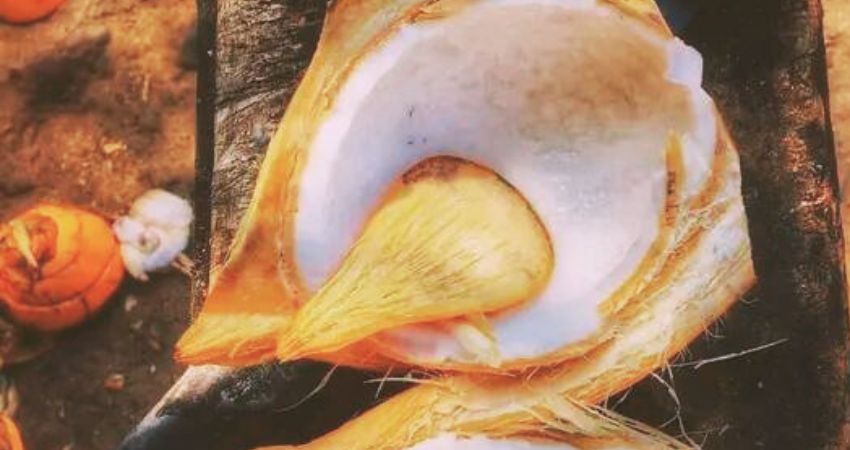
Fresh Coconut Meat
Cut the meat into small pieces before offering it to your chinchilla. Ensuring the coconut is fresh and not treated with preservatives or chemicals is important.
Coconut Flakes
Coconut flakes can be sprinkled over chinchilla food or offered as a separate treat. Again, it’s important to choose unsweetened varieties.
Coconut Oil And Milk
Measure a quarter teaspoon of coconut oil/milk and add it to chinchilla food or use it as a supplement. Choosing high-quality, unrefined coconut oil/milk with no chemicals or preservatives is important.
Starting Small Is the Key
Offer a small piece and monitor their reaction before increasing the amount. Remember, coconut or any other treat should not replace your chinchilla’s regular hay, pellets, and freshwater diet.
Risks Associated With Chinchilla Eating Too Much Coconut
Every good thing must have a bad side. Here are the risks your chinchilla faces if it eats too much coconut.
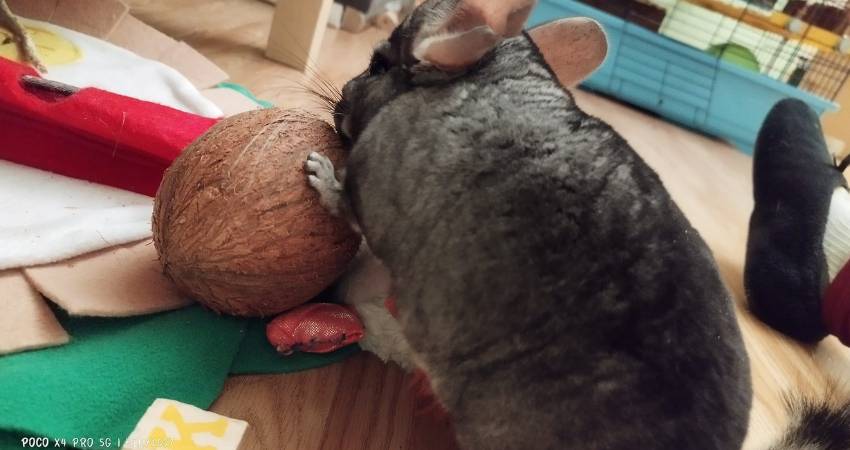
High in Fat
Coconut meat is high in fat, which can harm a chinchilla’s health if consumed in large quantities. Obesity can result from eating too much fat, leading to various health problems like diabetes, heart disease, and joint problems.
Digestive Problems
Chinchillas have sensitive digestive systems, and consuming too much coconut can lead to gut problems such as watery poop and gas. This is because coconut is high in fiber and can be difficult to digest in large amounts.
Lack Of Essential Nutrients
If a chinchilla consumes too much coconut, it may develop a liking for the fruit. This may cause the chinchilla not to get enough of the essential nutrients it needs from its regular diet. Coconut is not a substitute for a balanced diet.
What Are Other Alternatives To Coconuts?
Plenty of healthy options are available if you’re looking for alternative treats for your chinchilla. Here are some suggestions:
Hay
Hay is an essential part of a chinchilla’s diet, and it’s also a great source of fiber for maintaining healthy digestion. Offer your chinchilla various types of hay, such as timothy, orchard grass, or oat hay.
Fresh Vegetables
Fresh vegetables can provide your chinchilla with additional nutrients and variety. Some good options include kale, spinach, carrots, and lettuce. However, it’s important to introduce new vegetables slowly and in small amounts, as too much can upset their digestion.
Fruits
What fruits can chinchillas eat? Besides coconut, chinchillas can enjoy apples, cheerios, berries, kiwis, pears, and raisins. However, because fruits are high in sugar, they should be given sparingly and only as a supplement to their regular diet.
Herbs
Fresh herbs such as parsley, cilantro, and basil can provide your chinchilla with added nutrients. Just avoid feeding them any toxic herbs such as mint or chives.
Commercial Treats
There are also many commercially available treats, specifically designed for chinchillas that can provide a healthy and convenient option. Look for treats made from natural ingredients, and avoid those with added sugars or artificial flavors.
Can chinchillas eat dried coconut?
No, dried coconut is not suitable for chinchillas. This is because dry coconut may swell up in the chin’s stomach when it mixes with fluids. Also, dried coconut is high in fat and sugar, which can harm chinchillas, especially if consumed in large quantities.
Can baby chinchillas eat coconut?
No. Giving them coconut or other treats is not recommended until they are six months old. Baby chinchillas require a balanced diet high in fiber and low in fat.
Can you use coconut substrate with a chinchilla?
Yes, you can. Coconut substrate is suitable for chinchillas, gerbils, and even hammies. It provides insulation and a soft cushion for these small animals.
Parting Wisdom
Coconuts can be a nutritious and tasty treat for chinchillas, but only in moderation. Coconuts are high in fiber, vitamins, minerals, and healthy fats, all of which are beneficial to your chinchilla’s health. And when introducing new treats to your chinchilla, always start small.
In addition to coconuts, you can provide your chinchilla with other healthy treats such as hay, fresh vegetables, and limited amounts of fruits. It is critical to provide a balanced diet that meets your chinchilla’s nutritional needs and consult a veterinarian if you have any concerns.
